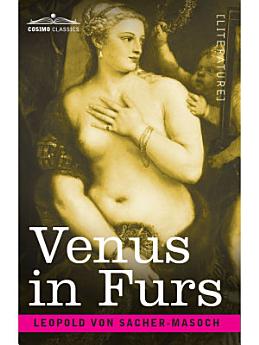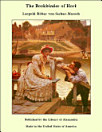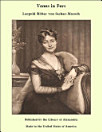Venus in Furs
জুন ২০১৫ · Cosimo Classics
ইবুক
126
পৃষ্ঠা
family_home
যোগ্য
info
reportমূল্যাংকন আৰু পৰ্যালোচনা সত্যাপন কৰা হোৱা নাই অধিক জানক
এই ইবুকখনৰ বিষয়ে
A novella that was originally part of the epic series Legacy of Cain by Leopold von Sacher-Masoch, Venus in Furs is an exploration of the themes of sado-masochism and female dominance in a time when the terms had yet to be conceived. The main character dreams of the goddess Venus wearing furs while he speaks to her about love. Unable to let go of the fantasy, he reads a book that tells the story of Severin and Wanda, a couple involved in a sado-masochistic relationship. Severin enslaves himself to Wanda, who treats him with ever-increasing brutality and disdain. The novel was translated into English in 1921 by Fernanda Savage, and has been adapted multiple times for film and theater. In 2013, it was adapted for film again into a French movie by the same title, based on the 2010 play by American playwright David Ives, which was in turn inspired by this classic.
লিখকৰ বিষয়ে
LEOPOLD VON SACHER-MASOCH (1836-1895) was an Austrian journalist and author, best known for his romantic stories of Eastern Central European life. Sacher-Masoch studied law, mathematics, and history at the University of Graz and soon after became a professor in what is now the city of Lviv, Ukraine. He wrote several non-fiction works before focusing on Austrian folktales. Socialist and humanist ideals, as well as historical themes, heavily influenced his fictional writing; from the 1860s to the 1880s he published a wide variety of short stories, which soon eclipsed his non-fiction writing. Von Sacher-Masoch's most famous short story, Venus in Furs (1870), originally part of the Legacy of Cain series, is one of only a few of his titles translated into English. The sado-masochistic themes of the tale, as well as von Sacher-Masoch's own proclivities, contributed to the term "masochism" being derived from his name.
এই ইবুকখনক মূল্যাংকন কৰক
আমাক আপোনাৰ মতামত জনাওক।
পঢ়াৰ নির্দেশাৱলী
স্মাৰ্টফ’ন আৰু টেবলেট
Android আৰু iPad/iPhoneৰ বাবে Google Play Books এপটো ইনষ্টল কৰক। ই স্বয়ংক্রিয়ভাৱে আপোনাৰ একাউণ্টৰ সৈতে ছিংক হয় আৰু আপুনি য'তে নাথাকক ত'তেই কোনো অডিঅ'বুক অনলাইন বা অফলাইনত শুনিবলৈ সুবিধা দিয়ে।
লেপটপ আৰু কম্পিউটাৰ
আপুনি কম্পিউটাৰৰ ৱেব ব্রাউজাৰ ব্যৱহাৰ কৰি Google Playত কিনা অডিঅ'বুকসমূহ শুনিব পাৰে।
ই-ৰীডাৰ আৰু অন্য ডিভাইচ
Kobo eReadersৰ দৰে ই-চিয়াঁহীৰ ডিভাইচসমূহত পঢ়িবলৈ, আপুনি এটা ফাইল ডাউনল’ড কৰি সেইটো আপোনাৰ ডিভাইচলৈ স্থানান্তৰণ কৰিব লাগিব। সমৰ্থিত ই-ৰিডাৰলৈ ফাইলটো কেনেকৈ স্থানান্তৰ কৰিব জানিবলৈ সহায় কেন্দ্ৰত থকা সবিশেষ নিৰ্দেশাৱলী চাওক।







